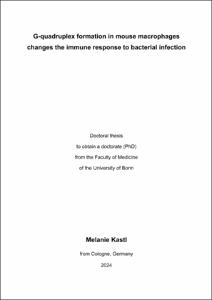Kastl, Melanie: G-quadruplex formation in mouse macrophages changes the immune response to bacterial infection. - Bonn, 2024. - Dissertation, Rheinische Friedrich-Wilhelms-Universität Bonn.
Online-Ausgabe in bonndoc: https://nbn-resolving.org/urn:nbn:de:hbz:5-73506
Online-Ausgabe in bonndoc: https://nbn-resolving.org/urn:nbn:de:hbz:5-73506
@phdthesis{handle:20.500.11811/11217,
urn: https://nbn-resolving.org/urn:nbn:de:hbz:5-73506,
doi: https://doi.org/10.48565/bonndoc-194,
author = {{Melanie Kastl}},
title = {G-quadruplex formation in mouse macrophages changes the immune response to bacterial infection},
school = {Rheinische Friedrich-Wilhelms-Universität Bonn},
year = 2024,
month = jan,
note = {G-quadruplexes (G4s) are stable secondary structures that form in guanine-rich regions of DNA and RNA. Guanines bind via Hoogsteen hydrogen bonding and form G tetrads that stack upon each other and become stabilized by a cation in the center. Nowadays it is proven that G4s form in vivo and influence a variety of biological processes, including transcription, translation, replication, and telomere maintenance. More than 700,000 sites in the human and mouse genomes have the potential to form a G4. Since G4s are enriched in oncogenic promoters, they are targeted in cancer therapy. The contribution of tumor-associated macrophages (TAMs) in the tumor environment has been controversially discussed. Therefore, linking cancer and inflammation and analyzing the role of G4s in macrophages is an emerging research question.
The here presented doctoral thesis provides a detailed analysis of the role of G4s in mouse macrophages during bacterial infection mimicked by lipopolysaccharide (LPS). It was shown that G4s form in macrophages and can be stabilized by the G4-specific ligand pyridostatin (PDS). While the key macrophages function of phagocytosis was unaffected by G4 stabilization, G4 formation was shown to reduce the immune response-related cytokine expression and secretion. These transcriptome-wide changes affecting the immune response to bacteria are modulated by changes in the activity of the transcription factor NF-κB, a master regulator in orchestrating host defense. ATAC-Seq to map the chromatin landscape revealed that G4 stabilization modulates the accessibility of transcription start sites which could explain the transcriptomic changes.
The data presented here provide the basis for a novel role of G4s in the immune response to bacteria in macrophages. These findings open the possibility to discuss G4s as a drug target to control the immune response, for example during an endotoxic shock (sepsis) induced by exposure to LPS.},
url = {https://hdl.handle.net/20.500.11811/11217}
}
urn: https://nbn-resolving.org/urn:nbn:de:hbz:5-73506,
doi: https://doi.org/10.48565/bonndoc-194,
author = {{Melanie Kastl}},
title = {G-quadruplex formation in mouse macrophages changes the immune response to bacterial infection},
school = {Rheinische Friedrich-Wilhelms-Universität Bonn},
year = 2024,
month = jan,
note = {G-quadruplexes (G4s) are stable secondary structures that form in guanine-rich regions of DNA and RNA. Guanines bind via Hoogsteen hydrogen bonding and form G tetrads that stack upon each other and become stabilized by a cation in the center. Nowadays it is proven that G4s form in vivo and influence a variety of biological processes, including transcription, translation, replication, and telomere maintenance. More than 700,000 sites in the human and mouse genomes have the potential to form a G4. Since G4s are enriched in oncogenic promoters, they are targeted in cancer therapy. The contribution of tumor-associated macrophages (TAMs) in the tumor environment has been controversially discussed. Therefore, linking cancer and inflammation and analyzing the role of G4s in macrophages is an emerging research question.
The here presented doctoral thesis provides a detailed analysis of the role of G4s in mouse macrophages during bacterial infection mimicked by lipopolysaccharide (LPS). It was shown that G4s form in macrophages and can be stabilized by the G4-specific ligand pyridostatin (PDS). While the key macrophages function of phagocytosis was unaffected by G4 stabilization, G4 formation was shown to reduce the immune response-related cytokine expression and secretion. These transcriptome-wide changes affecting the immune response to bacteria are modulated by changes in the activity of the transcription factor NF-κB, a master regulator in orchestrating host defense. ATAC-Seq to map the chromatin landscape revealed that G4 stabilization modulates the accessibility of transcription start sites which could explain the transcriptomic changes.
The data presented here provide the basis for a novel role of G4s in the immune response to bacteria in macrophages. These findings open the possibility to discuss G4s as a drug target to control the immune response, for example during an endotoxic shock (sepsis) induced by exposure to LPS.},
url = {https://hdl.handle.net/20.500.11811/11217}
}





